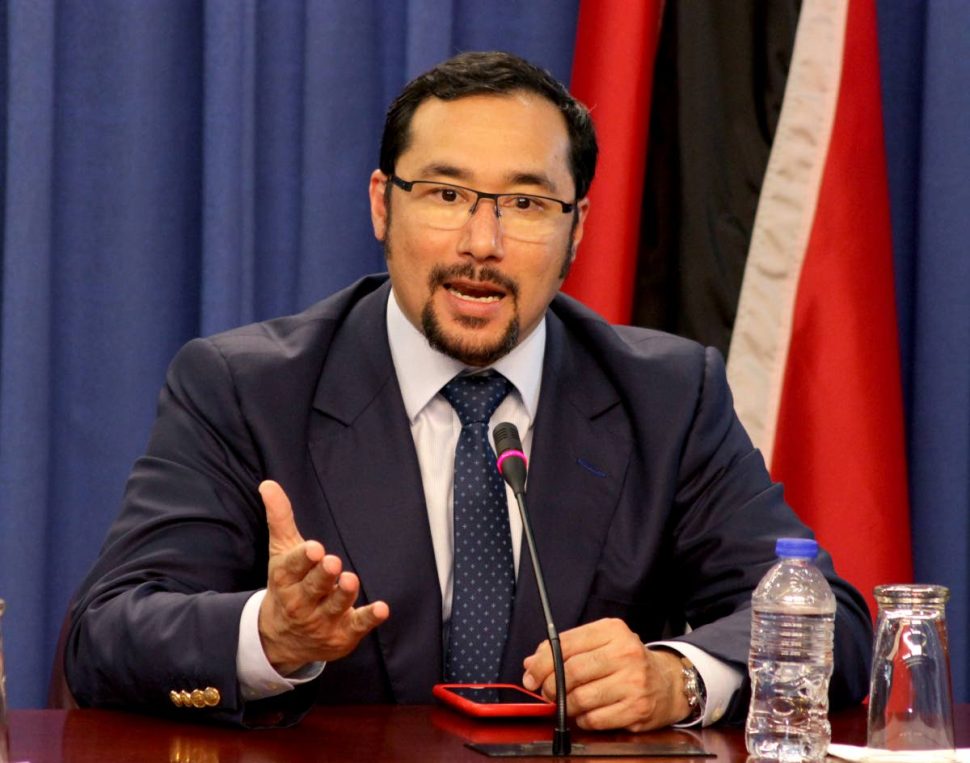(Trinidad Guardian) Minister of National Security Stuart Young has warned that Trinidad and Tobago nationals who recently returned home from abroad and have been told to self-quarantine will now face strong action if they breach the order.
Young gave the warning even as he and other Government officials refused to directly confirm whether television personality Ian Alleyne had indeed contracted the virus during a press conference at the Ministry of Health Wednesday.
Young, Minister of Health Terrence Deyalsingh and Chief Medical Officer Roshan Parasram all cited patient confidentiality as they refused to confirm Alleyne’s claim, made on social media on Tuesday, that he had tested positive for the virus.
“There is something called a patient charter of rights. Any patient, regardless of status, socio-economic status, profession, whatever, they are entitled to patient confidentiality,” said Deyalsingh in response the questions about the Crimewatch host.
However, he said all those who felt they had been in contact with someone who has tested positive or is suspected of having COVID-19 should self-isolate and contact the hotline where they would be advised further.
Guardian Media was informed by several medical practitioners that patient confidentiality stands even if the individual has divulged their information. Doctors are only allowed to reveal such medical information with the patient’s consent.
While not stating a name, Young made a few references to the video posted to social media, where Alleyne stated he had tested positive for COVID-19, as he (Young) sought to drive home the point that irresponsible behaviour could put scores of people at risk.
“Moving around, as we have seen happen by personalities, that has led to serious contact spread risk. It (COVID-19) does not respect, the virus does not respect your status, or what perceived status you may think you have,” Young said.
“To say that you don’t think that this could have happened to you when you have tested positive is of no use to all of the people that you have put yourself into contact with when you should have been self-quarantined. We are going to be taking strong positions with respect to that.”
He added, “From a National Security point of view, this is a serious concern and we use this opportunity as an example to us all of how contact spread really works because it is real and now amongst you all, from the messages that I have been getting. And how one person being irresponsible can be in contact with all of us in this room and we don’t even know, and for extended periods, you are just doing your job, you are being sent on assignment to do your job.
“All of that could be defeated by the irresponsibility of persons who have travelled and then saying ‘well I’m feeling well let me go out there.’ And that is why there is a mandatory period of 14 days for high-risk people.”
Pointing to the fact that 44 of the nationals who were quarantined after returning from a Caribbean cruise had so far been confirmed positive, Young said, “But you don’t have that opportunity with everybody. So persons who have travelled and this is now a live example amongst you all, and with that level of exposure.”
Guardian Media attempted to contact the Minister following the press conference to explain further what action could be taken against someone who breaks self-quarantine and puts others at risk, but did not receive a response up to the time of publication.
Parasram said a full list of individuals who had entered this country over the past two weeks has been sent to the T&T Police Service and the Defence Force so that those people can be monitored.
“It does not a take a large number of people doing the irresponsible thing to spread this disease to all of us. So what my committee has been doing, the inter-ministerial committee, in particular the Trinidad and Tobago Police Service and Defence Force, as well as the Immigration Division, they have already sent to me a listing of most of the persons who have come through the borders over the last 14 days. We have actually put that in an excel format,” Parasram said.
“And if people are found errant under the Quarantine Act, we will actually use the quarantine act to do three things if needed.
“We will impose quarantine in a facility if it is required, whether it be a hospital or it be another facility of the Government’s choice; we will improve stricter quarantine if need be with police around the clock around your homes, or we can impose fines which are fines which we have said before—six months’ imprisonment if required or $6,000 as the need be.”





